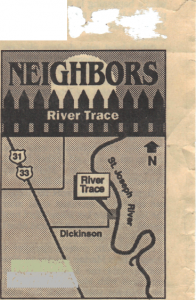Old estate restored in Royalton
By CAROL KNAPP
H-P Special Correspondent

What began as a business venture for two property developers three years ago quickly turned into a labor of love when they began to restore and make improvements to a 163-acre centennial estate passed down through three generations of one prominent St. Joseph family.
David Harris says that when he and his business partner, Don Litke, purchased the former Hoffman Estate on Dickinson Road in Royalton Township, initially it was because of the tranquil setting and the breath-taking view. The view includes a 90-foot drop from the hardwood and evergreen tree-lined cliffs circling the property, renamed River Trace Estates, to the St. Joseph River directly below.
However, Harris said the venture took on a whole new significance as they peeled away the dense thicket allowed to grow over several years to discourage vandals and other trespassers, to reveal the rich history behind their new acquisition.”It took a three-man crew, including my own father, the better part of that first summer to clear away the brush with chainsaws at first because it was such close work, and then with backhoes and other heavy equipment later on,” Harris noted.”What attracted me at first, besides the peace and quiet of the place, was the carpet of pine needles underfoot, and the fact that you couldn’t walk around the property without looking for deer trail and listening to the sounds of nature, like birds singing and the wind in the trees,” Harris said. He added that the majority of the people he’s brought out to look at the development have been drawn back “time and time again” to sit and enjoy its simple beauty.
Harris and Litke acquired half of what was once a much larger estate from Sally Hoffman and her husband, Edward Hoffman, whose grandfather, William Dickinson, purchased the property sometime . around the late 1880s.
Dickinson, co-founder of the Marquette Cement Company in Chicago along with his brother, Theodore, and another partner during the mid 1880s, lived in Illinois and built the Dickinson Estate on the St. Joseph River estate as a summer retreat. Theodore Dickinson, for whom St. Joseph High School’s football stadium was named, maintained a sizeable farm on the site where the high school is currently located.
Executive offices for the Marquette Cement Company were located in Chicago before the business was moved to Nashville and then sold, according to Lyle Witte. Witte, who with his wife, Caroline Hoffman Witte, Hoffman’s sister, retains ownership of the remaining half of the original estate where Mrs. Witte owned and operated a riding school for many years.
The estate was divided between brother and sister some 15 years ago. Witte owns and operates an interior design business on the corner of Marquette Woods Road and U.S. 31, about a quarter-mile from Dickinson Road.
All that remains of some previous houses on the estate are an iron entrance gate with its period mail drop set into cement columns, an adjoining stone and cement wall surrounding the site where a house once stood, an overgrown garden containing two Georgian-style tea houses built out of Indiana limestone and cement, and a massive cement retaining wall, crumbling in places, built to protect the bluff from erosion and to provide a garden enclosure. A weathered cement water tower, used for irrigation purposes, also remains.
Harris said as much as possible of what is still standing on the property will be retained as a common area to help establish the turn-of-the century theme for the 39-lot planned urban development. The one-acre lots are priced from $45,000 to $115,000 each, depending on their proximity to the river, Harris said.
He added that it’s been his and Litke’s intent from the beginning to deed several hundred acres of bottom land on the river to a nature conservancy, although the details would remain up to the homeowners’ association to iron out.
